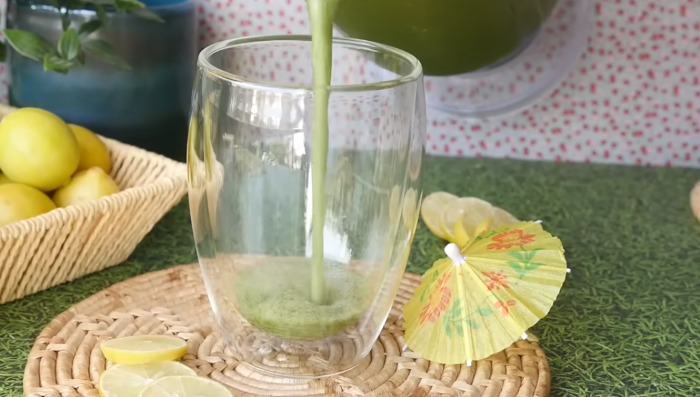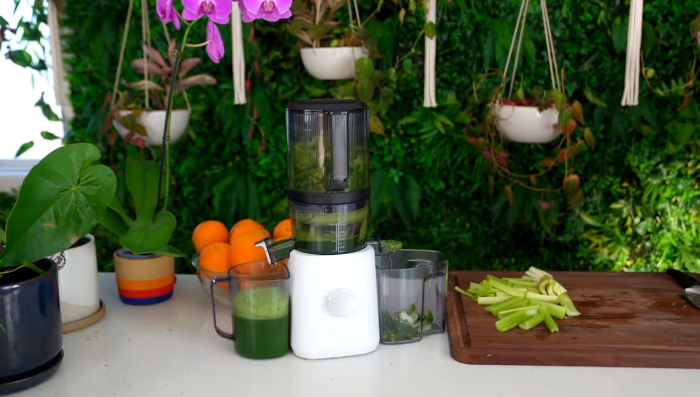Juicing has become a popular trend in recent years, offering a convenient way to consume essential nutrients from fruits and vegetables. But storing fresh juice can be a challenge. The type of container you use, the method of storage, and even the type of juicer can affect the quality and longevity of your juice.
Whether you’re using mason jars, hermetic jars, or stainless steel containers, understanding the right techniques is crucial. Plastic containers, even BPA-free ones, can leak harmful chemicals into your juice, so they should be avoided. From immediate consumption to storing juice for up to 72 hours, this guide will provide expert insights to help you enjoy your juice at its best. Let’s dive into the world of juicing and explore how to store juice effectively, keeping it fresh and nutritious.
Step by step instructions for safely storing fresh juice:
By following these steps, you can enjoy fresh, nutritious juice for up to three days, maximising the benefits of your juicing efforts.
- Choose the Right Container: Opt for glass containers like mason jars or hermetic jars. Avoid plastic, even BPA-free, as it may leak harmful chemicals.
- Prepare Before Juicing: Have your storage containers ready and space in your fridge cleared before you start juicing.
- Fill to the Top: Minimize oxygen exposure by filling the container to the top. Oxygen degrades nutrients, so less air means fresher juice.
- Seal Tightly: Use airtight lids to prevent spoilage. For mason jars, wet the seal before screwing it on.
- Refrigerate Immediately: Place the juice in the fridge right away. Cold, dark areas help preserve the juice’s quality.

- Consider the Juicer Type: Juice from centrifugal juicers lasts 24 hours, while cold press juicers allow up to 72 hours of storage.
- Avoid Freezing: Though possible, freezing can alter the taste of your juice.
- Monitor for Signs of Degradation: Look for changes in color or taste. If you notice any, discard the juice.
- Label Your Juice: Include the contents and date of creation to keep track of freshness.
- Drink Within Recommended Time: Consume within 24 to 72 hours, depending on the juicer type, for optimal flavor and nutrition.
- Add Citrus for Preservation: A slice of lemon or other citrus can help preserve the juice’s quality.
- Avoid Plastic for Organic Produce: Especially with organic fruits and vegetables, plastic can deteriorate due to fewer synthetic chemicals.
- Use Stainless Steel for On-the-Go: If you need to keep your juice cold while traveling, stainless steel bottles are a great option.
What are the different containers used for storing fresh juice?
Mason Jars
Mason jars are a top choice for storing fresh juice. These glass containers are convenient and come with lids that prevent spillage. The saleable lids also keep air out, preserving the juice’s quality. Mason jars are easy to fill and clean, and they can be found in various sizes to suit your needs. They are a reliable and widely available option for juice storage.
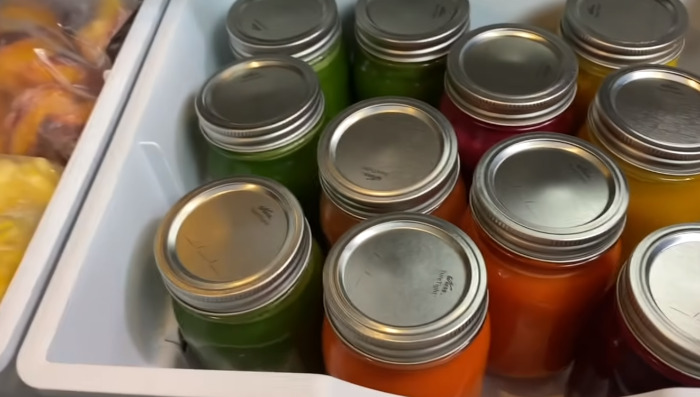
Hermetic Jars
Hermetic jars offer an airtight seal, making them another excellent choice for juice storage. Often used for storing herbs and spices, hermetic jars are also suitable for juice. The airtight seal within the glass lid, held firm by attached fasteners, ensures that the juice stays fresh. These jars come in different sizes, providing flexibility for your juicing needs.
Glass Bottles
For those looking for a portable option, glass bottles are perfect. They are better than plastic, especially when a clear bottle is required for beverages. Some glass bottles are designed with carrying loops for extra comfort and safety. Though heavier than plastic, glass bottles are a natural and durable choice for juice storage.
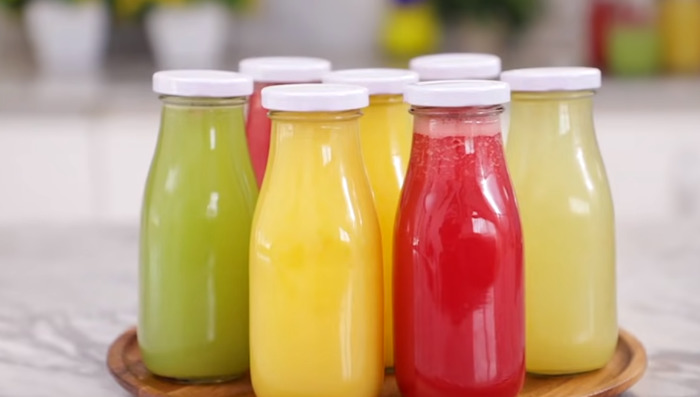
Glass Pitchers
If you’re entertaining guests and want to serve a large batch of juice, glass pitchers are the way to go. Available in one-liter and two-liter sizes, they are perfect for serving juice within a few hours. However, they are not suitable for long-term storage as they cannot be tightly sealed.
Stainless Steel Jugs & Tumblers
Stainless steel containers are great for carrying juice on the go. They protect the juice from air exposure and sunlight while preserving its temperature. Stainless steel doesn’t break easily and fits perfectly in cup holders. Whether at work, during workouts, or driving, stainless steel containers are a practical choice.
How Storing Fresh Juice is Affected By The Type of Juicer?
The type of juicer you use has a significant impact on how you store fresh juice. Let’s break it down.
With fast or centrifugal juicers, the juice’s shelf life is typically 24 hours. These juicers introduce a lot of oxygen, breaking down the juice’s integrity and destroying essential nutrients in a process called oxidation. Storing juice from centrifugal juicers for later consumption doesn’t make much sense, as the quality degrades quickly. If you have a centrifugal juicer, it’s best to drink the juice right away.
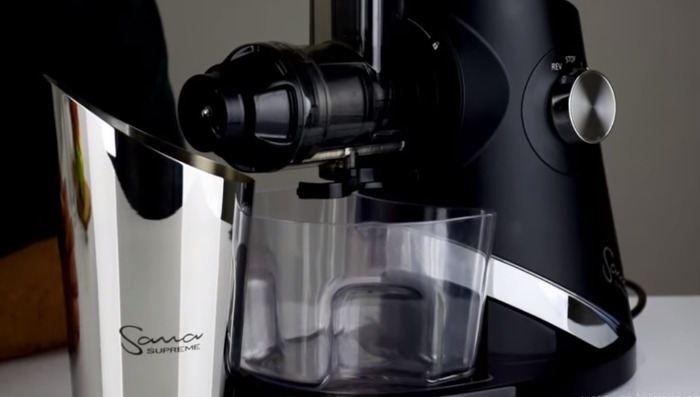
On the other hand, cold press juicers, including masticating and twin gear juicers, offer a longer shelf life of about 72 hours. These juicers operate at lower RPM, reducing oxidation and preserving the juice’s nutritional value. If you’re planning to store juice, a cold press juicer is the way to go.
In summary, the type of juicer you choose will directly affect how long you can store your juice and how you should store it. Understanding your juicer’s characteristics will help you make the most of your fresh juice, whether you’re enjoying it immediately or saving it for later.
Why not use plastic containers for storing fresh juice?
Using plastic containers for storing fresh juice is a common practice, but it’s not the best choice. Here’s why.
Plastic containers can leach harmful substances into your juice. The chemicals and acids from the fruits can deteriorate the plastic, leading to contamination. This is even more concerning when storing organic produce, as the lack of synthetic chemicals in organic farming can still lead to the deterioration of plastic.
Moreover, if you’re aiming to enjoy nutrient-rich juice with minimal synthetic chemical exposure, avoiding plastic is essential. Even though organic farming allows for the use of natural pesticides and a few synthetic ones, the interaction with plastic can still lead to negative health effects.
The best alternatives for storing juice are glass jars and stainless steel bottles. Glass jars are ideal for keeping juices cold at home, while stainless steel bottles are often thermally insulated, perfect for on-the-go.
Conclusion:
Storing fresh juice properly is an art that requires understanding various factors. From the type of juicer used to the choice of containers, every detail matters. Cold press juicers offer a longer shelf life, while centrifugal juicers demand immediate consumption. Glass jars and stainless steel bottles are the preferred containers, avoiding plastic due to potential harmful leaching. Experts advise careful preparation, including refrigeration and proper sealing, to maximize the quality and lifespan of the juice.
Organic produce, though not entirely free from chemicals, provides a richer and safer juice experience. The key to enjoying fresh juice is following these guidelines, embracing the best practices, and being mindful of the choices you make. Whether you’re a juice enthusiast or a health-conscious individual, these insights equip you with the knowledge to savor the best of what fresh juice has to offer.
FAQs:
How long can freshly squeezed juice be kept?
The shelf life of freshly squeezed juice depends on the type of juicer and storage method. Juice from centrifugal juicers lasts up to 24 hours, while cold press juicers offer a shelf life of about 72 hours. Proper storage in glass or stainless steel containers, away from air and sunlight, is crucial. If you follow these guidelines, you can enjoy nutrient-rich juice with minimal loss for up to 3 days.
What happens to the juice that is too old?
When juice becomes too old, it undergoes degradation, leading to a change in color and taste. The essential nutrients and vitamins break down, and the juice may develop a funny smell. This process is accelerated by exposure to air, sunlight, and improper storage. Consuming juice past its prime not only diminishes the flavor but can also pose health risks. It’s best to discard juice that shows signs of degradation.
Do you have to drink the juice immediately after juicing?
Drinking juice immediately after juicing is ideal for centrifugal juicers, as the juice’s integrity breaks down quickly due to oxidation. However, with proper storage techniques, juice from cold press juicers, including masticating and twin gear juicers, can last up to 72 hours. While immediate consumption ensures maximum freshness and nutrient retention, it’s not always necessary if you follow the right storage methods.




